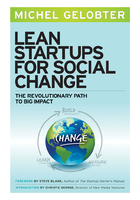
The Lean Startup for Social Change
The lean startup turns the traditional, process-heavy approach to innovation on its head. It replaces detailed planning, consensus-building, and fundraising for something you aren’t quite sure will work with speed, experimentation, and direct interaction with the people you are trying to reach. Initially the purview of software startups, the lean startup has jumped the fence to some of the world’s largest companies, including Facebook, Google, and General Electric. Lean startup techniques are how these companies now regularly serve billions of people.
Social change advocates as well as a wide variety of traditional nonprofits and government agencies have also started adopting some lean startup techniques. The Obama administration launched the General Services Administration’s 18F and then the broader US Digital Service to upend how the federal government delivers services. Mott Hall Bridges middle school in New York City’s Brownsville neighborhood endowed a program fully in less than a week (and ultimately raised more money than it needed) to overcome the systemic bias that keeps qualified low-income kids out of the best colleges. Invisible Children, a faith-based student organization, reached tens of millions of people in one week to raise awareness of war crimes in Africa. By using the lean startup model for social change, these efforts delivered social innovation more quickly and with a higher return for all the blood, sweat, and tears that went into getting them off the ground.
Lean startup practice has just begun to take hold in the business world, but its implementation in the social sector is still rare and piecemeal. This book aims to change that so that innovators and leaders across the social sector can accelerate and expand their impact to meet the challenges of our times.